Ever find yourself grappling with the fear of being left alone? Let’s learn about abandonment trauma symptoms – how it sneaks in, messes with your head, and, most importantly, how to heal from it!
What is Abandonment Trauma?
From the moment we are born, we start forming attachments to our parents, grandparents, caregivers, and other family members. These attachments are necessary for physical, emotional, and psychological development. It lays a strong foundation for understanding how to build healthy relationships in the long run.
Love, affection, and nurture helps a child grow into a healthy adult, with high self-esteem and a sense of security. They know no fear and always confident in exploring the world or seeking new experiences.
But, if a child is neglected in the early years or grows up in an environment that lacks affection, nurture, and support; the child may experience what is known as abandonment trauma also known as post-traumatic stress disorder (PTSD) of abandonment.
Read How Childhood Trauma Impacts our Physical, Emotional and Relational Health
Signs of Abandonment Trauma Or PTSD Of Being Abandoned
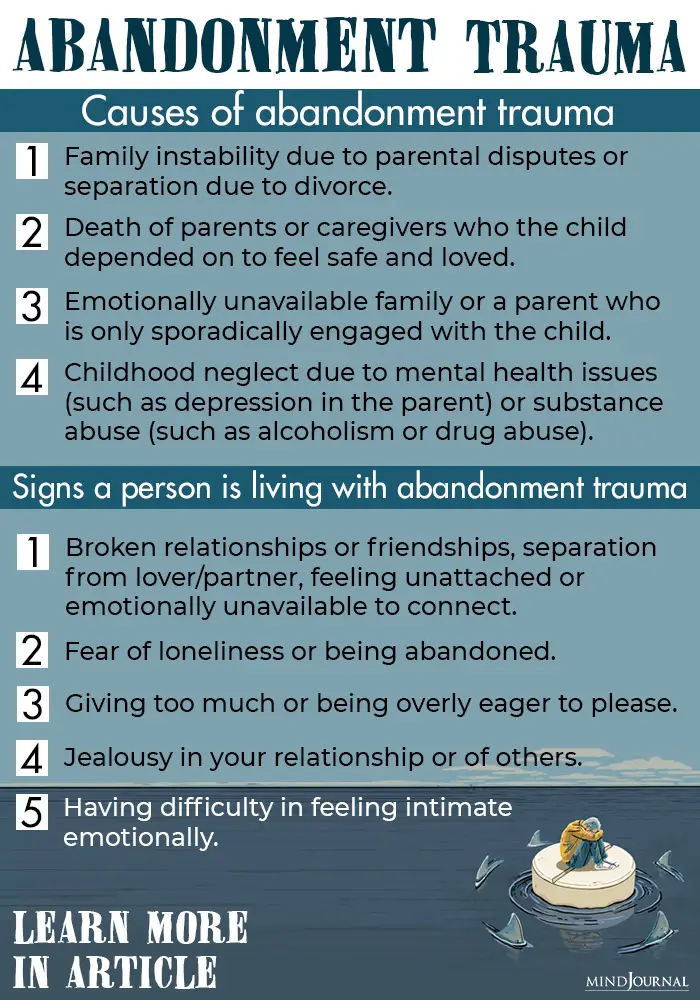
The effect of trauma may vary from person to person depending on biological, financial, social, environmental factors. But, there are some abandonment trauma symptoms that indicate a person is living with hidden pain.
- Broken relationships or friendships, separation from lover/partner, feeling unattached or emotionally unavailable to connect.
- Fear of loneliness or being abandoned.
- Holding on to toxic or abusive relationships, to avoid feeling lonely or abandoned.
- Giving too much or being overly eager to please
- Jealousy in your relationship or of others
- Having difficulty in feeling intimate emotionally
- Avoiding all relationships or friendships.
- Low self-esteem and self-worth.
- Lack of trust within the relationship
- Anxiety and depression.
- Feelings of unsafety, helplessness, inadequacy, and being “not enough.”
- Self-destructive behaviors.
- Fear of conflict within a relationship, or avoiding the conflict at all costs.
- Reacting too much or not at all to difficult situations.
- An excessive need for control over other people or situations.
- Self-judgment and perfectionism.
- Setting unrealistic expectations.
- Emotional flashbacks, leading to feelings of panic or intense emotional distress.
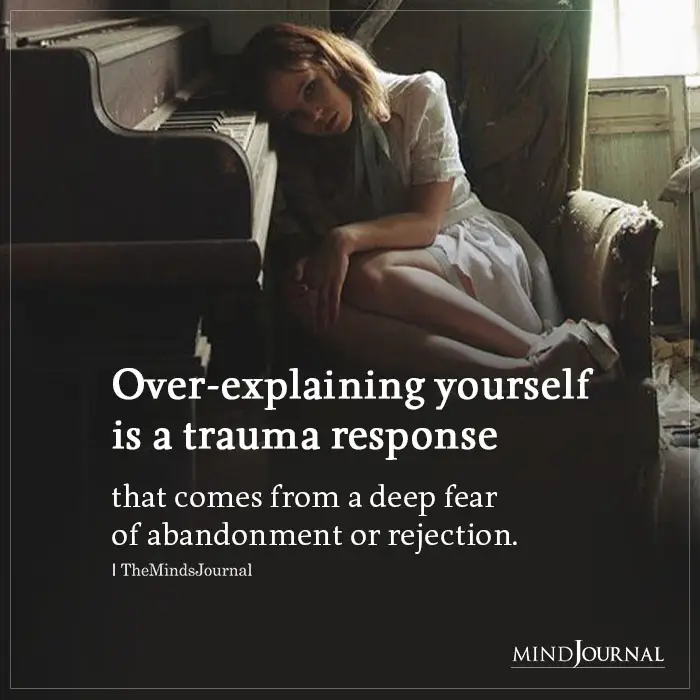
Read A Guide To Understanding The Fear Of Abandonment And Object Constancy
Causes of Abandonment Trauma
1. Abandonment trauma is caused by adverse experience or experiences in childhood that leave you feeling insecure, fearful, and lonely.
2. Growing up with severe emotional distrust has a negative impact on a person’s physical and mental health.
3. A child having unhealthy attachments, loss of a strong relationship, or a dysfunctional family such as –
- Family instability due to parental disputes or separation due to divorce
- Death of parents or caregivers who the child depended on to feel safe and loved
- Emotionally unavailable family or a parent who is only sporadically engaged with the child.
- Childhood neglect due to mental health issues (such as depression in the parent) or substance abuse (such as alcoholism or drug abuse)
- Childhood neglect due to physical illness (such as paralysis) leaving the parent unable to fulfill the child’s basic needs like love and attention
Impact of Abandonment Trauma on child development
Whether it is due to parental divorce or dysfunctional family or any other reason that parent or caregiver is not able to love protect and care for their child, abandonment trauma leaves a child feeling unloved, unimportant, unsafe, and unsure of how to meet their personal needs.
Such children lack a sense of stable and safe relationships throughout their developmental years. They don’t know how to build and grow healthy relationships even in adulthood.
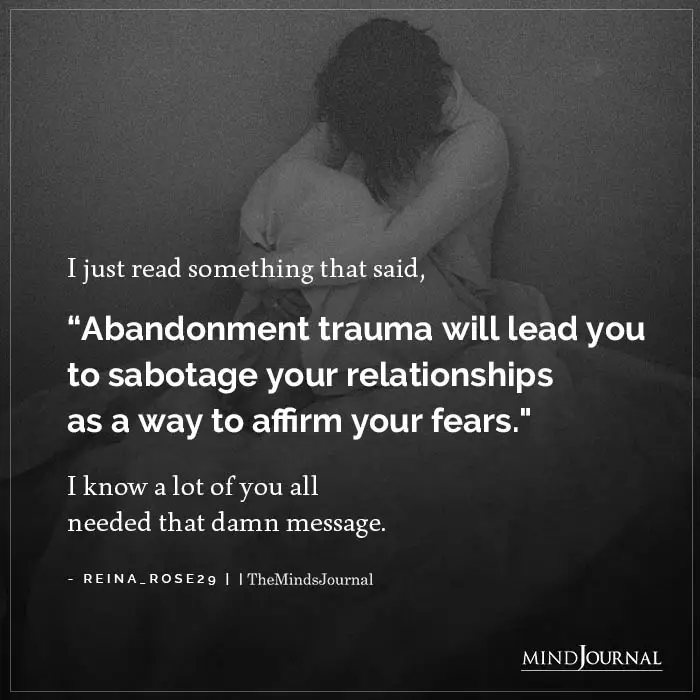
Strong family relationships and support in early life help children develop the ability to identify – danger, toxic relationships, when and how to bond with new people, and meet personal needs.
But, adults who never received love and care in developmental years, fail to trust, identify danger, toxicity and are prone to betrayal, abusive relationships, and emotional distress. They develop trust issues and lack the ability to love and be loved by another person.
Over time, they develop poor brain function and psychological well-being. Many studies have reported high rates of eating disorders, substance use disorders, relationship difficulties, and mental health disorders in adults with abandonment trauma.
Besides parents not being able to care for the child due to divorce or mental/physical illness or influence of alcohol, there are many other causes of abandonment trauma or PTSD of abandonment.
Not every person with traumatic experiences in childhood suffers long-term issues as a result. They may contribute to problems later in life especially when combined with other forms of trauma or other family problems.
Existing studies show that abandonment trauma more commonly occurs during the developmental years of childhood and early adulthood. But, the events that trigger abandonment trauma can happen at any time in life. For example, adults may experience abandonment trauma due to the sudden death of a partner or divorce. The bereaved person may feel insecure, unloved, and less equipped to have healthy relationships in the future.
3 Types of Abandonment Issues
Insecure attachment styles lead to abandonment issues. There are three attachment styles –
1. Avoidant Attachment Style
People with this attachment style stay aloof, private, or withdrawn and don’t let anyone come closer to them.
Read 5 Signs Of Unhealthy Attachment In Relationships
2. Anxious attachment style
People with this style of attachment develop intensely close and dependent relationships with others. They feel anxious at the thought of separating from their partner or loved one. So, they tend to be emotionally reactive and act out of fear.
3. Disorganized Attachment Style
This attachment style makes people anxious at the thought of being in a relationship. They want to avoid intimacy or closeness but can be inconsistent. This attachment style comes with other potential disorders.

Read The 7 Kinds Of Hidden Trauma That Shouldn’t Be Ignored
Treating Abandonment Trauma In Adults
The aim of abandonment trauma treatment is to help people:
- Overcome fears
- Trust and build healthy relationships.
- Avoid self-sabotage in relationships as a result of anxiety.
- Avoid the tendency to isolate or withdraw from others.
- Develop high self-esteem and self-worth lost due to traumatic experiences in childhood.
- Cope up with anxiety, stress, and interpersonal conflicts
- Managing co-occurring disorders such as depression, bipolar disorder, borderline personality disorder, and other conditions that can fuel the eating disorder.
Read The Reason Emotional Trauma Doesn’t Heal and How to Overcome It
Recovering from abandonment trauma requires a comprehensive approach that lays the groundwork for long-term recovery.
Steps of abandonment trauma treatment:
1. Identify triggers
The first and foremost step to treat abandonment trauma is to identify the triggers and practice withdrawing when these triggers come up.
2. Talk to someone
This is another effective way to deal with abandonment issues. Vent out your frustration, insecurities, or fear in front of your partner or a family member, or a trusted friend. Get more comfortable talking about your feelings in a calm and respectful member.
3. Mental health professional
Consulting a licensed counselor or psychiatrist and seeking therapy is a very crucial step. Therapy (such as cognitive behavioral therapy and dialectical behavior therapy), counseling, and trauma treatment techniques such as EMDR – are effective in overcoming the abandonment trauma.
Therapy is the mode of treatment designed to identify the root of abandonment issues, need to control, fears and negative thought patterns and replace them with healthy, positive, and more realistic thoughts. The health team will also try to find issues with anxiety, obsessions or compulsions, a desire to control, and past traumas.
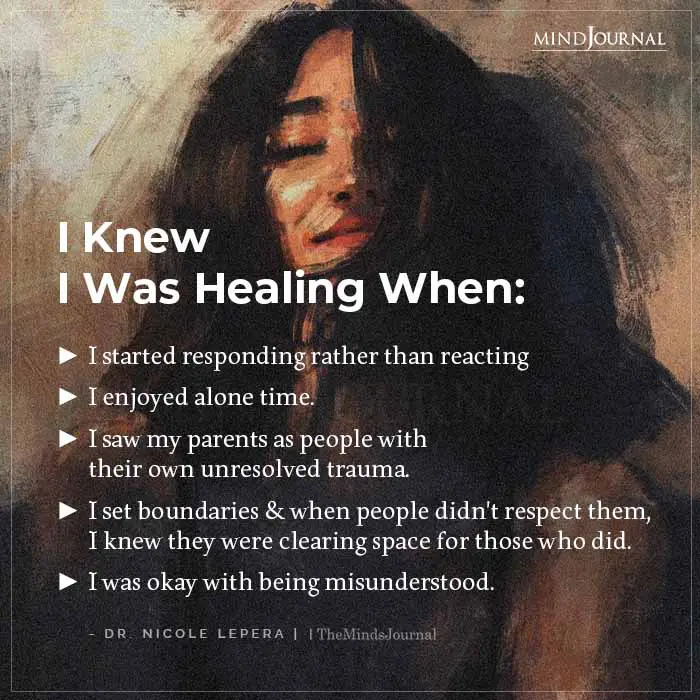
Approaching a therapist for abandonment trauma can also make you feel secured. The mental health professional will teach you how to establish boundaries in relationships, foster healthy bonding, and avoid toxicity or abuse. Individuals learn how they deserve to be treated by those they interact with, and those they love.
A Mental health professional will design a treatment plan (which may also include medication) based on your specific needs and teach you healthy coping skills.
They may use a multidisciplinary approach to treat co-occurring disorders emanating from abandonment issues. It is important for you to avail right resources and support to treat abandonment trauma.
4. Self-care
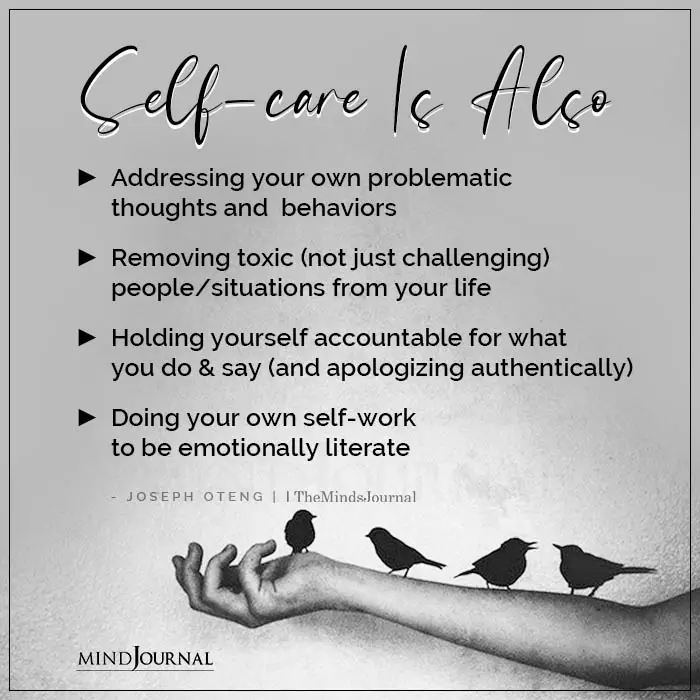
This is another powerful weapon that will help you fight abandonment trauma according to studies. Health care experts have emphasized the concept of self-care time and again whether it is dealing with physical health issues or mental illnesses.
Self-care activities like journaling, taking walks, or drawing – help a person meet his or her emotional needs, which in turn improves friendships and relationships. Doing what you enjoy will give you a sense of fulfillment and improve your contributions to your family members, friends, or children.
Self-care may also involve residential treatment (supported by experts) for eating disorders such as following a healthy diet and recommendations given by a nutritional counselor.
That’s all about abandonment trauma. I hope that you understood how lack of love and care in early childhood can scar children for the rest of their lives. If you think you are suffering from abandonment trauma or know anyone who needs treatment, please refer to mental health professional and avail best services and support.
Please share this article with anyone who you may think will find it valuable and helpful.
References
- Purcell, W. J. (1996). The attachment-trauma complex. The American journal of psychoanalysis, 56(4), 435-446.
- Haynal, A. (1989). The concept of trauma and its present meaning. International review of psycho-analysis, 16, 315-321.
- Van der Kolk, B. A. (2007). The Developmental Impact of Childhood Trauma.
- Van der Kolk, B. A., Perry, J. C., & Herman, J. L. (1991). Childhood origins of self-destructive behavior. American journal of Psychiatry, 148(12), 1665-1671.
- Kira, I., Lewandowski, L., Somers, C. L., Yoon, J. S., & Chiodo, L. (2012). The effects of trauma types, cumulative trauma, and PTSD on IQ in two highly traumatized adolescent groups. Psychological Trauma: Theory, Research, Practice, and Policy, 4(1), 128.
- Hurvich, M. (2004). Psychic trauma and fears of annihilation. Living with terror, working with trauma: A clinician’s handbook, 51-66.
- Brennan, K. A., & Shaver, P. R. (1998). Attachment styles and personality disorders: Their connections to each other and to parental divorce, parental death, and perceptions of parental caregiving. Journal of personality, 66(5), 835-878.
- Viniegra, C. C., & Aumeunier-Gizard, M. F. (2021). Facilitating integrated mental, emotional, and physical states in children who have suffered early abandonment trauma. European Journal of Trauma & Dissociation, 5(4), 100214.
- Lawson, D. M. (2017). Treating adults with complex trauma: An evidence‐based case study. Journal of Counseling & Development, 95(3), 288-298.
- Brown, M. Z., & Dahlin, K. (2017). Dialectical behavior therapy for treating the effects of trauma.
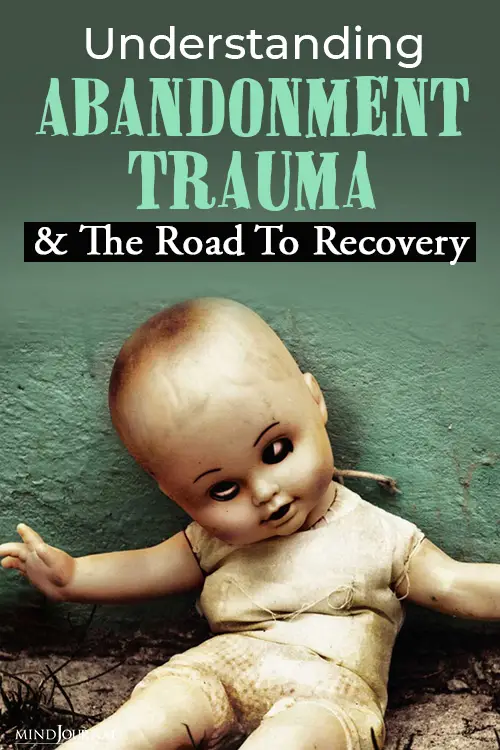
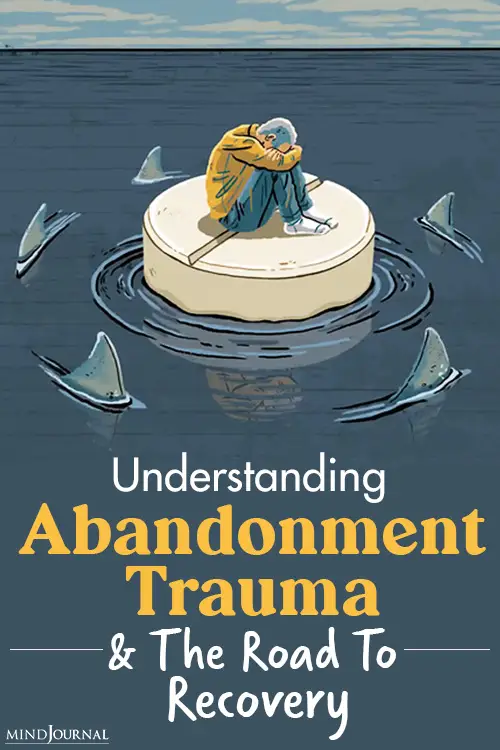
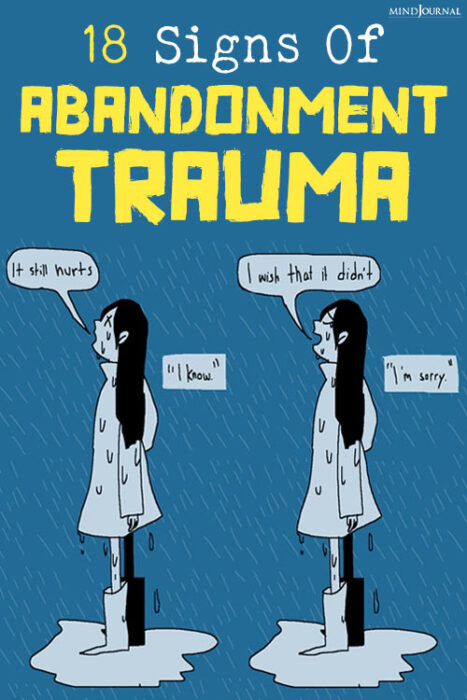
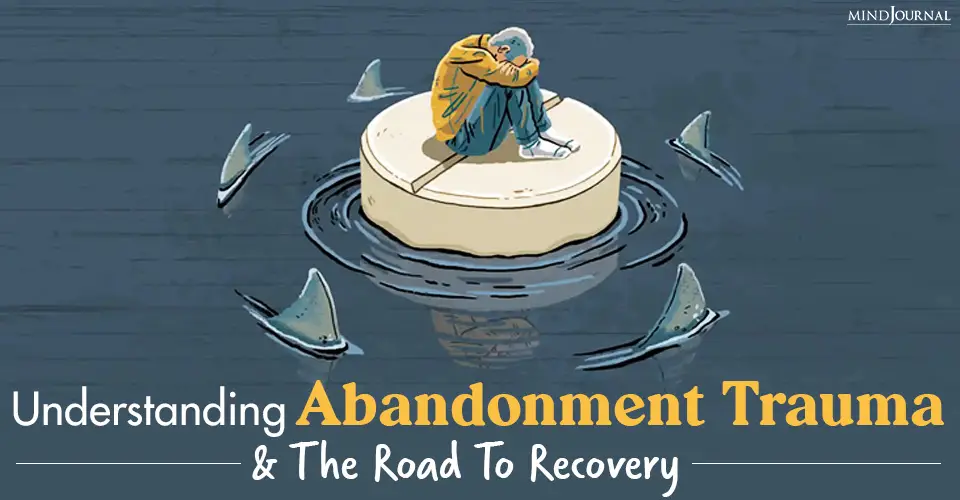






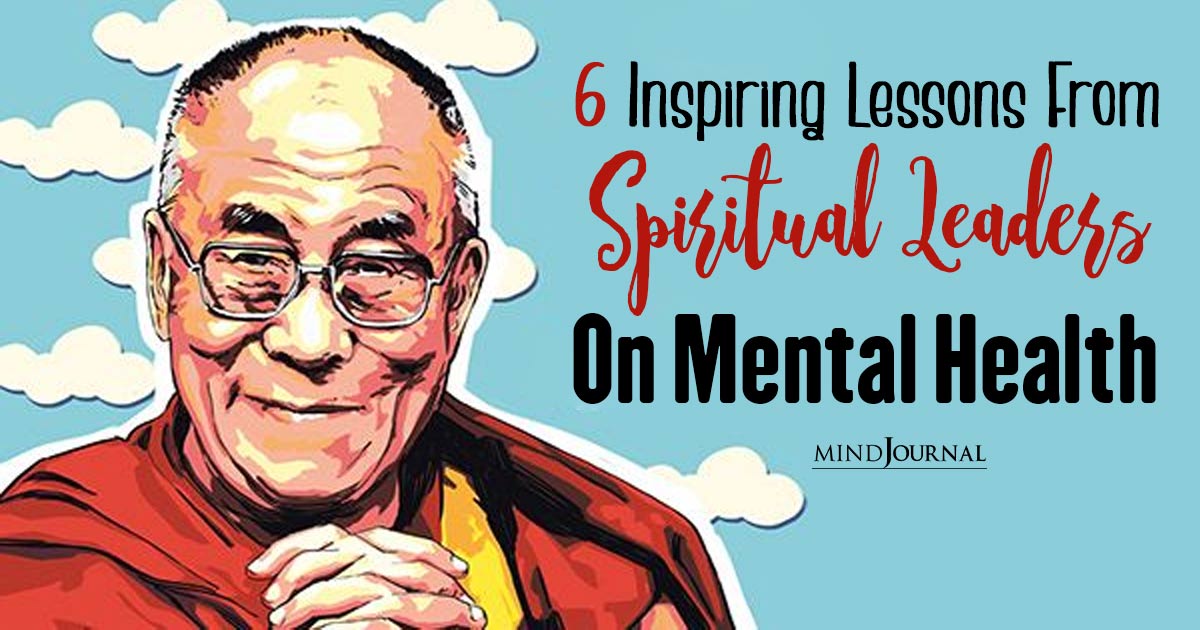
Leave a Reply
You must be logged in to post a comment.